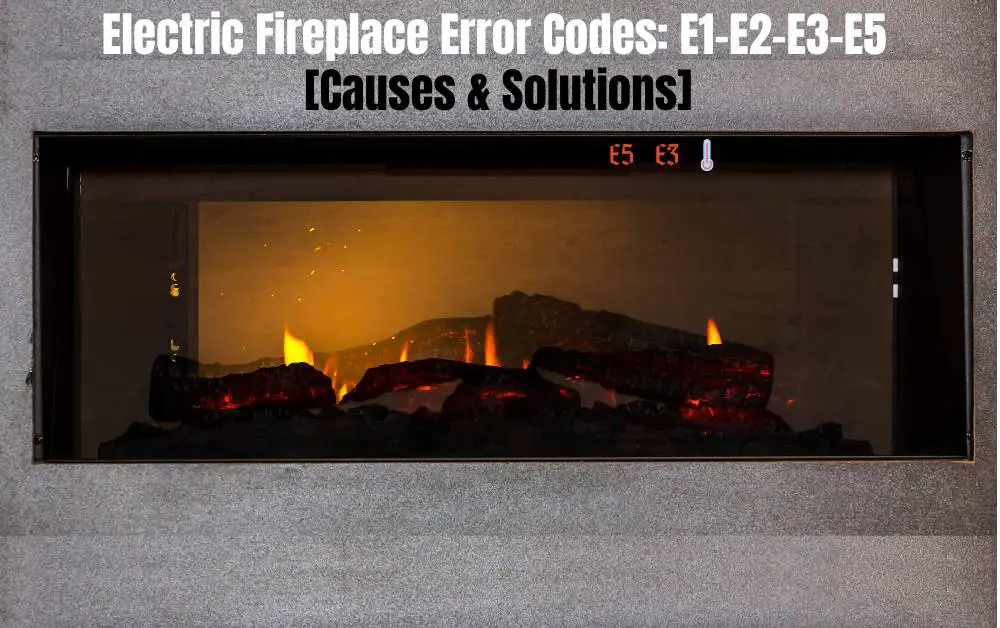With the rising energy prices and increasing concerns about the environmental impact of our choices, finding an economical and sustainable heating solution is essential. In recent years, electric fireplaces have gained popularity as an alternative to central heating systems, raising the question: Is an electric fireplace cheaper than central heat?
It’s essential to recognize that electric fireplaces and central heating systems have pros and cons. The ultimate winner can be determined based on a variety of factors.
Is an Electric Fireplace Cheaper than Central Heat?
Yes, on average, when considering the total cost, including the initial investment, installation, fuel, and maintenance, electric fireplaces emerge as more affordable and reliable than central heating systems. However, it’s essential to recognize that electric fireplaces and central heating systems have pros and cons. The ultimate winner can be determined based on a variety of factors.
Electric Fireplace Vs Central Heat Cost Comparison Chart 2025
| Aspect | Electric Fireplace | Central Heating |
|---|---|---|
| Initial Installation Cost | $200 – $1,000 | $3,000 – $7,000 |
| Energy Source | Electricity | Natural Gas / Electricity |
| Average Efficiency | 99% | 70-90% |
| Power Consumption | 1.5 kW per hour | 3 kW per hour (electric furnace) |
| Average Cost per kWh | $0.13 | $0.13 (electricity) / $1.00 per therm (natural gas) |
| Heating Capacity | Up to 400 sq. ft. per unit | Whole house |
| Average Usage per Day | 5 hours | 8 hours |
| Daily Operating Cost | $0.975 (5 hrs x 1.5 kW x $0.13) | $3.12 (8 hrs x 3 kW x $0.13) |
| Monthly Operating Cost | $29.25 (30 days) | $93.60 (30 days) |
| Annual Operating Cost | $351 | $1,123.20 |
| Maintenance Cost | Low | Moderate to High |
| Heating Effectiveness | Spot heating | Whole home |
| Aesthetic Value | High (visual appeal, ambiance) | Low to Moderate |
| Space Requirement | Minimal | Significant (ductwork, unit space) |
| Portability | High (can be moved) | Fixed |
| Environmental Impact | Dependent on electricity source | Dependent on heating source |
Our Top 3 Recommendations:
| Image | Product | Details | Price |
|---|---|---|---|
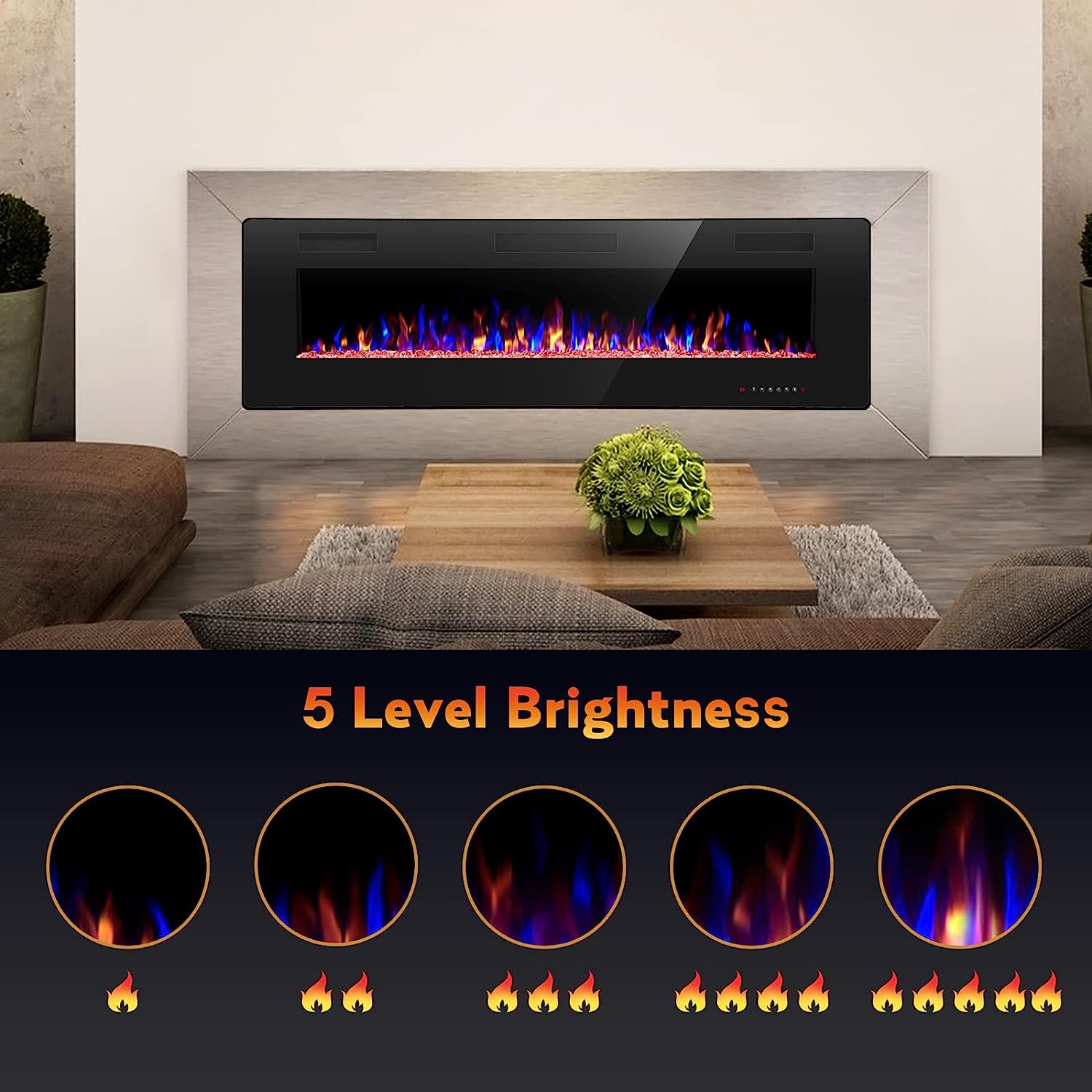 |
R.W.FLAME 60″ Recessed and Wall Mounted Electric Fireplace | Power Source: Corded Electric Product Dimensions: 3.85″D x 60″W x 18.11″H Installation Type: Wall Mount Heat Output: 1500 Watts Room Type: Living Room |
Check Price |
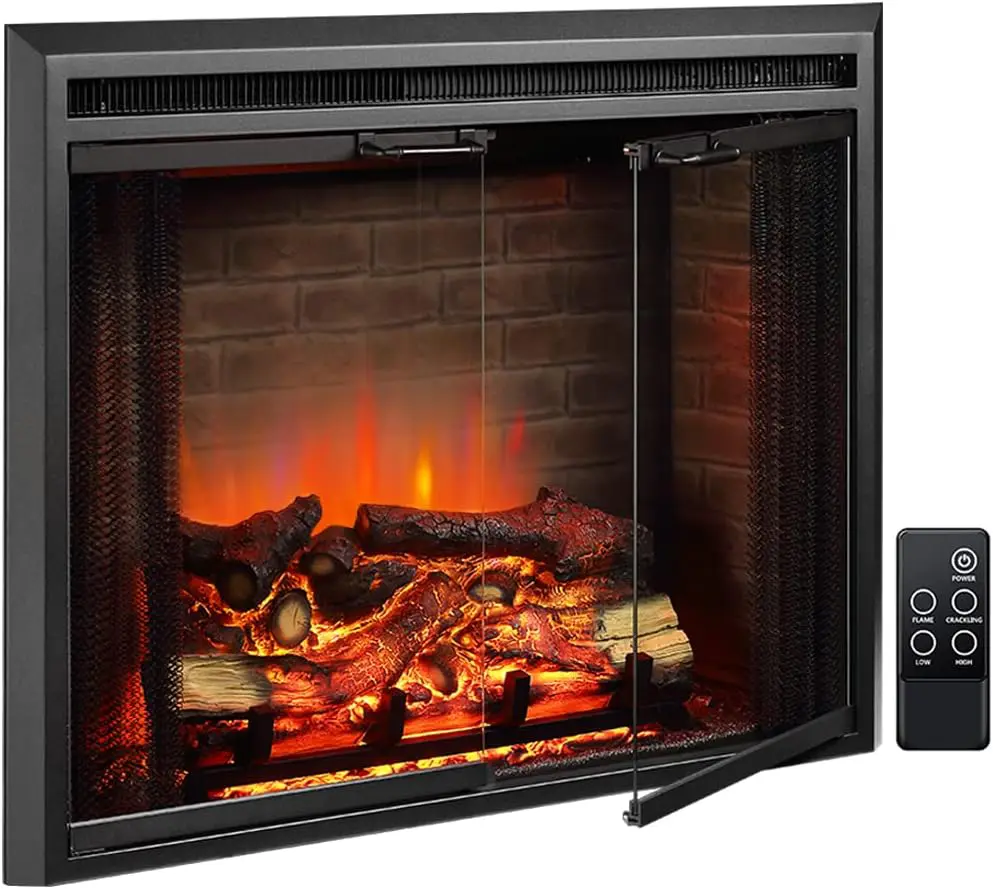 |
PuraFlame Klaus Electric Fireplace | Power Source: Corded Electric Product Dimensions: 8.78″D x 35.04″W x 26.96″H Material: Wood, Resin, Glass Installation Type: Freestanding, Wall Mount Heat Output: 5118 BTU |
Check Price |
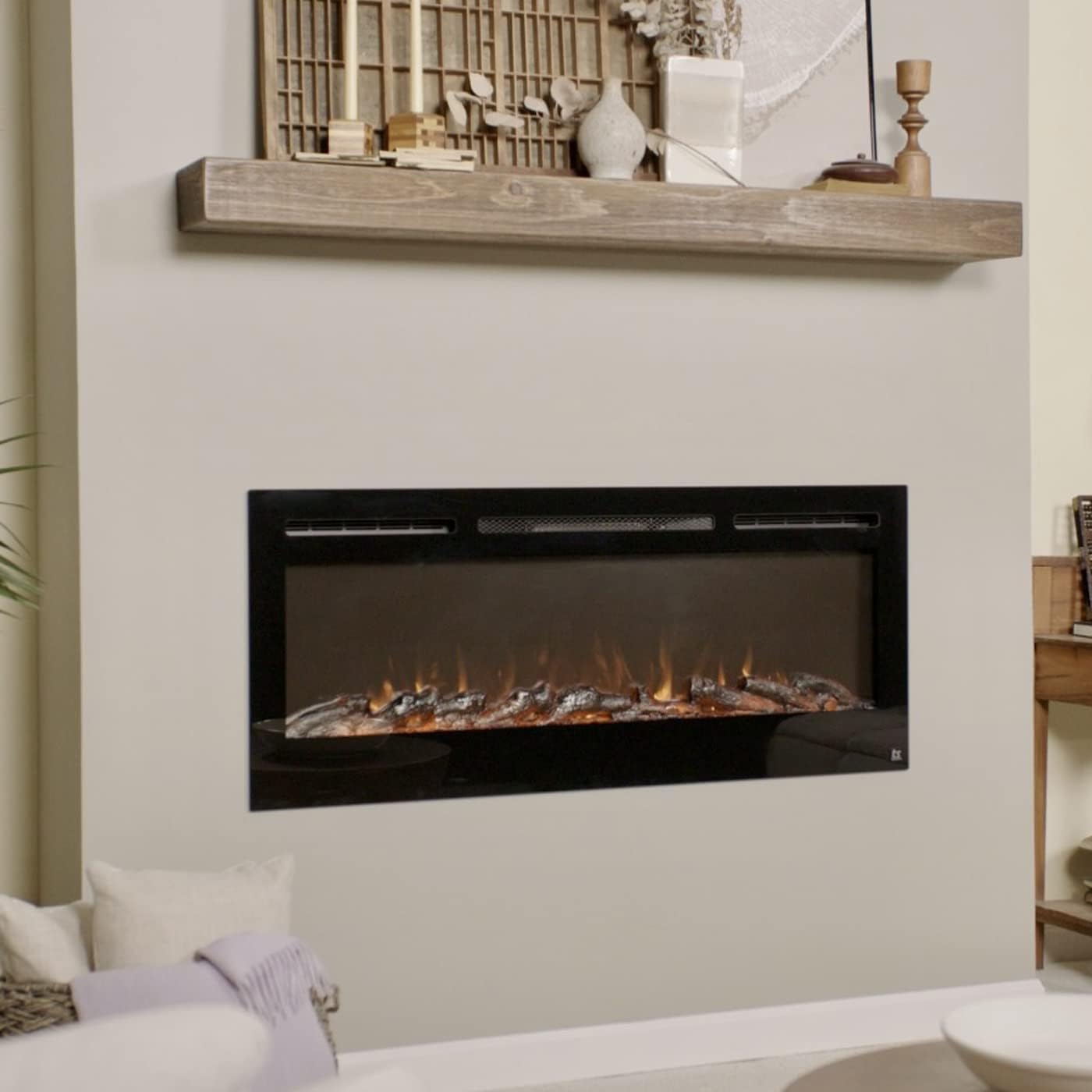 |
Touchstone 80004 – The Sideline Electric Fireplace |
Power Source: Corded Electric Product Dimensions: 5.5″D x 50.4″W x 21.5″H Material: Glass Installation Type: Wall Mount Heat Output: 5000 BTU |
Check Price |
How Electric Fireplace is Cheaper than Central Heating.
The Initial Investment
The initial investment is one of the first considerations when comparing an electric fireplace to a central heating system. A central heating system typically involves significant upfront costs, including installing heating units, ductwork, and a thermostat.
On the other hand, electric fireplaces are generally more affordable and easier to install, making them an attractive option for those on a budget or in rental properties.
Energy Consumption and Operating Costs
Electric Fireplace
Electric fireplaces are celebrated for their exceptional energy efficiency as they directly convert electrical energy into heat, leaving no room for heat loss typically encountered in traditional combustion systems.
They offer zone heating, allowing you to heat specific areas of your home rather than the entire space. This targeted approach can lead to substantial energy savings, especially if you spend most of your time in a single room.
Moreover, modern electric fireplaces often come with programmable thermostats and timers, enabling you to regulate the heating duration and maintain a comfortable temperature without wasting energy.
In this context, electric fireplaces can be cost-effective and energy-efficient for those seeking to reduce their utility bills.
Central Heat
Central heating systems rely on heated air or water distribution throughout the house.Which can lead to inefficiencies, as heat loss may occur through ducts or pipes.
While central heating can be effective for larger homes or those requiring uniform heating, it might be less efficient for smaller living spaces.
The operating costs of a central heating system largely depend on the energy source used, such as electricity, natural gas, or oil.
While newer systems tend to be more energy-efficient, the cost of maintaining and repairing complex central heating systems should be considered when evaluating long-term expenses.
Fuel Source and Environmental Impact
Electric Fireplace
Electric fireplaces rely solely on electricity, which is considered cleaner than fossil fuels like natural gas or oil. As electric grids gradually shift towards renewable energy sources, the environmental impact of using electricity for heating diminishes.
Opting for an electric fireplace can significantly reduce your carbon footprint.
Central Heat
Various fuels can power central heating systems, each with environmental implications. While natural gas and oil are widely used, they release carbon dioxide and other pollutants when burned.
This contributes to air pollution and climate change. In contrast, some central heating systems can be designed to utilize renewable energy sources, such as solar panels or geothermal heat pumps, which offer a more sustainable option.
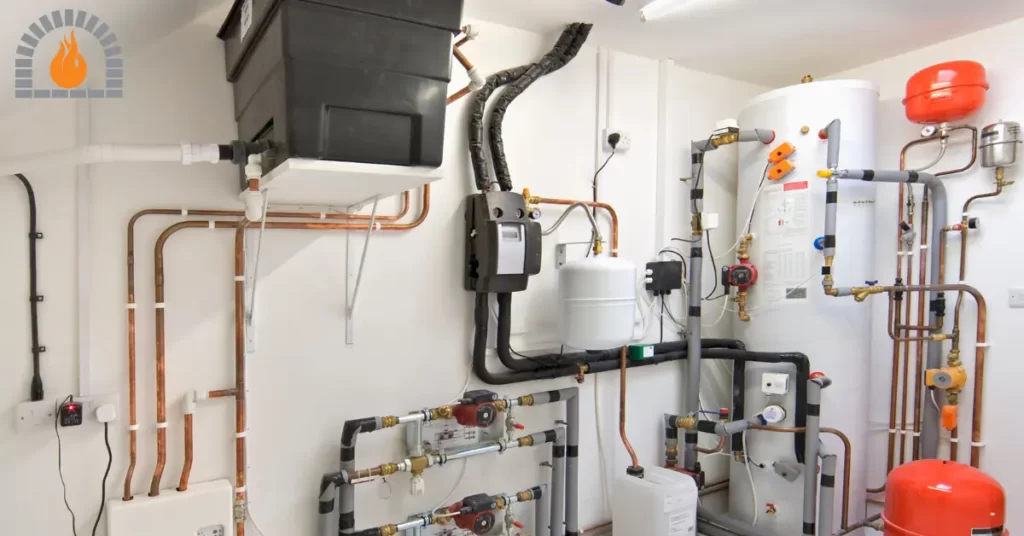
Maintenance and Lifespan
Electric Fireplace
Electric fireplaces are relatively low-maintenance compared to central heating systems. They do not require regular cleaning of ducts or chimneys, reducing maintenance costs and effort.
Electric fireplaces boast a longer lifespan than traditional fireplaces because they are not subject to wear and tear caused by combustion processes.
Central Heat
Central heating systems may require periodic maintenance to ensure efficient operation. Ducts should be cleaned, and filters should be replaced regularly to maintain proper airflow and heating performance.
The lifespan of central heating systems can vary depending on the type and maintenance, with some components needing replacement after a few years.
Aesthetics and Ambiance
Electric Fireplace
Beyond the practical aspects, electric fireplaces offer a unique advantage in terms of aesthetics. They come in various designs, from traditional mantelpiece styles to sleek wall-mounted units, offering a wide range of choices to complement your home’s decor.
Electric fireplaces also feature realistic flame effects, providing the cozy ambiance of a traditional fireplace.
Central Heat
Central heating systems lack the visual appeal of a real fireplace. They are hidden within walls or under floors, offering no direct aesthetic benefit.
However, some modern heating systems include features like flame simulation, but they may not match the charm and authenticity of a real electric fireplace.
Electric Fireplace Vs Central Heat
| Electric Fireplace | Central Heat |
|---|---|
| Electric fireplaces are generally more affordable and easier to install. | A central heating system typically involves significant upfront costs. |
| Directly convert electrical energy into heat. | Rely on heated air or water distribution throughout the house. |
| Electric fireplaces rely solely on electricity, which is considered cleaner than fossil fuels. | Various fuels can power central heating systems, each with environmental implications. |
| Electric fireplaces are relatively low-maintenance. | Central heating systems may require periodic maintenance. |
| Offer a unique advantage in terms of aesthetics. | Lack the visual appeal of a real fireplace. |
When to Prefer an Electric Fireplace Over Central Heating?
You should prefer an electric fireplace over central heating in the following situations:
Supplemental Heating
An electric fireplace is a better choice when you need extra warmth in specific areas of your home without heating the entire house. It allows you to heat individual rooms or zones, providing targeted warmth where you need it most.
Small Living Spaces
If you live in a small apartment, studio, or single room, an electric fireplace can efficiently heat the space without a central heating system.
It is a cost-effective and practical option for compact living areas.
Rental Properties
If you rent a property, you might not have control over the central heating system. An electric fireplace offers a convenient alternative for personalized heating without modifying the existing heating setup.
Energy Efficiency
Electric fireplaces can be more energy-efficient for small spaces or short heating durations. Using central or occasional heating for a single room can lead to energy wastage, making an electric fireplace a greener option.
Ambiance and Aesthetics
Electric fireplaces provide a cozy and inviting atmosphere, adding an aesthetic touch to your living space. If you value a fireplace’s ambiance and visual appeal, an electric one can be a great addition, even if you have central heating.
Ease of Installation
Installing an electric fireplace is typically straightforward and doesn’t require significant modifications or construction work.
On the other hand, central heating systems might involve complex installation, which makes electric fireplaces a quicker and more accessible option.
Backup Heating
Electric fireplaces can serve as backup heating sources during power outages, ensuring you have warmth when the central heating system is unavailable.
Individual Temperature Preferences
In shared living spaces or households with differing temperature preferences, using an electric fireplace in specific rooms allows occupants to customize their comfort levels without affecting others.
No Access to Gas Lines
If your home lacks access to natural gas or you prefer not to use it, an electric fireplace is an excellent alternative to gas-powered heating solutions.
When to Prefer Central Heating System Over an Electric Fireplace?
You should prefer central heating over an electric fireplace in the following situations:
Whole-House Heating
Central heating is the more practical choice when heating the entire house consistently. It provides a uniform temperature throughout the home, ensuring every room is adequately warmed.
Energy Efficiency for Large Spaces
Central heating can be more energy-efficient for larger homes or spaces than using multiple electric fireplaces to heat each room separately.
Lower Long-Term Costs
Central heating systems, particularly those that use efficient methods like gas or modern heat pumps, can offer lower long-term heating costs than running multiple electric fireplaces in different house areas.
Home Value
Central heating is a significant factor in determining a home’s value and can be attractive to potential buyers.
It is a standard heating system in many modern homes and may increase the overall market appeal of the property.
Convenience
Central heating systems are often controlled by a single thermostat, making it convenient to regulate the temperature throughout the house from one central location.
This ease of control can be more practical than managing individual electric fireplaces in various rooms.
Consistent Heating
Central heating maintains a consistent temperature throughout the day and night, providing comfort without the need to adjust or monitor each heating unit separately.
Efficient Heating for Cold Climates
Central heating systems can be more efficient and effective at maintaining comfortable indoor temperatures in regions with extremely cold winters.
Year-Round Use
Central heating can be used for both heating and cooling, offering a versatile HVAC (Heating, Ventilation, and Air Conditioning) solution, while electric fireplaces are primarily for heating purposes.
You May Also Like To Read:
FAQs
Are electric fireplaces more efficient than central heat?
No, electric fireplaces are generally less efficient than central heating systems.
Is it cheaper to run central heating all day?
No, it is generally not cheaper to run central heating all day. Using a programmable thermostat to control heating is more cost-effective, based on your schedule.
Is central heating cheaper than AC?
In general, central heating is cheaper to run than air conditioning.
Do electric fireplaces heat a room?
Electric fireplaces can heat a small area or a room, but their heating capacity is usually limited compared to traditional heating systems.
My Final Thoughts
Is an electric fireplace cheaper than central heat?
In conclusion, the cost-effectiveness and energy efficiency of an electric fireplace versus central heat depends on various factors, including the size of your home, energy prices in your region, and your personal preferences. Ultimately, both options have their strengths, and the best choice for you may not solely rely on economics but also environmental considerations and lifestyle preferences.
An electric fireplace is an excellent option if you seek an affordable, environmentally friendly, and visually appealing heating solution for smaller spaces or a supplemental heating source.
On the other hand, if you require consistent heating throughout a larger home or wish to explore sustainable energy sources, a well-designed central heating system might be the more suitable choice.
Always evaluate your specific needs and consult experts before making your final decision.
Affiliate Disclosure: Fireplaceadviser.com is a participant in the Amazon Services LLC Associates Program. We may earn a commission when you click on certain links on this site and purchase.

Hello!! I am Jamal Khan. I often fix my home electric heaters and gas stove problems and research the common issues in the heating units to improve my knowledge and expertise. The aim of establishing fireplaceadviser.com is to share my expertise and knowledge with my audience.











